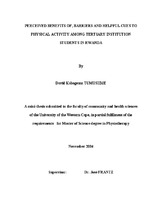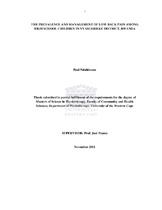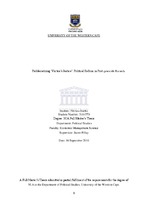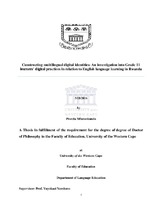Perceived benefits of, barriers and helpful cues to physical activity among tertiary institution students in Rwanda
Abstract
According to literature, particularly from data obtained from the World Health Organisation, physical inactivity or sedentarism is one of the leading causes of the major non-communicable diseases, which contributes substantially to the global burden of diseases, death and disability. The burden of mortality, morbidity and disability attributable to non-communicable diseases is currently greatest and is continuing to grow in the developing countries. Most declines in physical activity are during the transition from high school to college or university. The aim of the study was to ascertain perceptions of physical activity, specifically; perceived benefits of, perceived barriers and perceived helpful motivational factors to physical activity among tertiary institution students in Rwanda, and to find out whether demographic and background characteristics have an influence on these perceptions.
Collections
Related items
Showing items related by title, author, creator and subject.
-
The prevalence and management of low back pain among high school children in Nyamasheke District, Rwanda
Ndahimana, Paul (University of the Western Cape, 2011)Low back pain among high school children is perceived to be uncommon in the clinic setting. However, previous studies have suggested that it may be an important and increasing problem to be managed in this age group. The ... -
Problematizing 'victim's justice' : political reform in post-genocide Rwanda
Bachu, Nivrata (University of the Western cape, 2016)In this dissertation, I problematize 'victim's justice' in post-genocide Rwanda. I argue that the kind of justice that was meted out in post-genocide Rwanda, namely victors' justice and complementary to it – victims’ ... -
Constructing multilingual digital identities: An investigation into Grade 11 learners’ digital practices in relation to English language learning in Rwanda
Mfurankunda, Pravda (University of the Western Cape, 2016)Rwanda has taken a strong move towards language-in-education policy shift whereby English became the sole medium of instruction in 2008, despite her rich linguistic diversity. The language shift occurred at the time when ...




